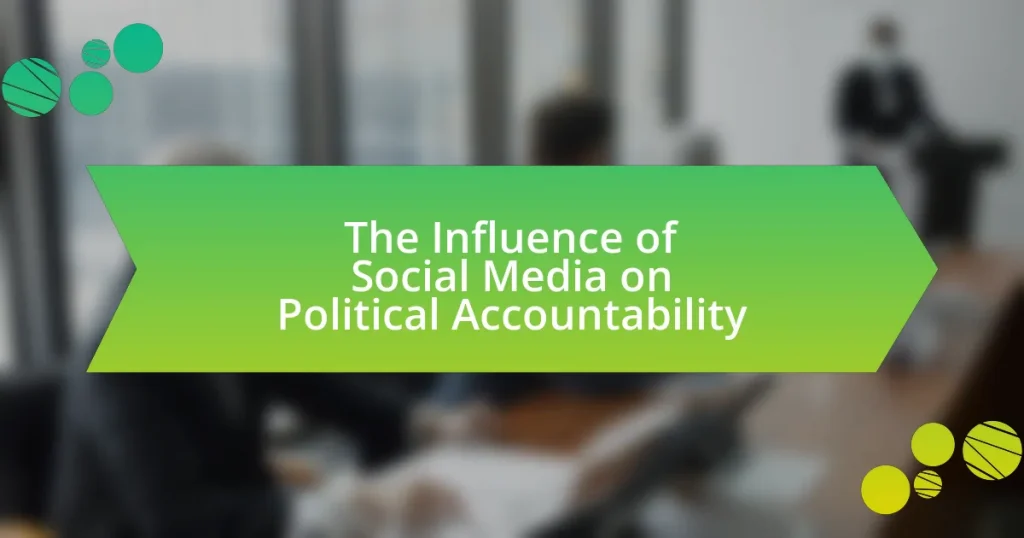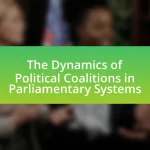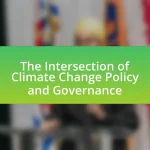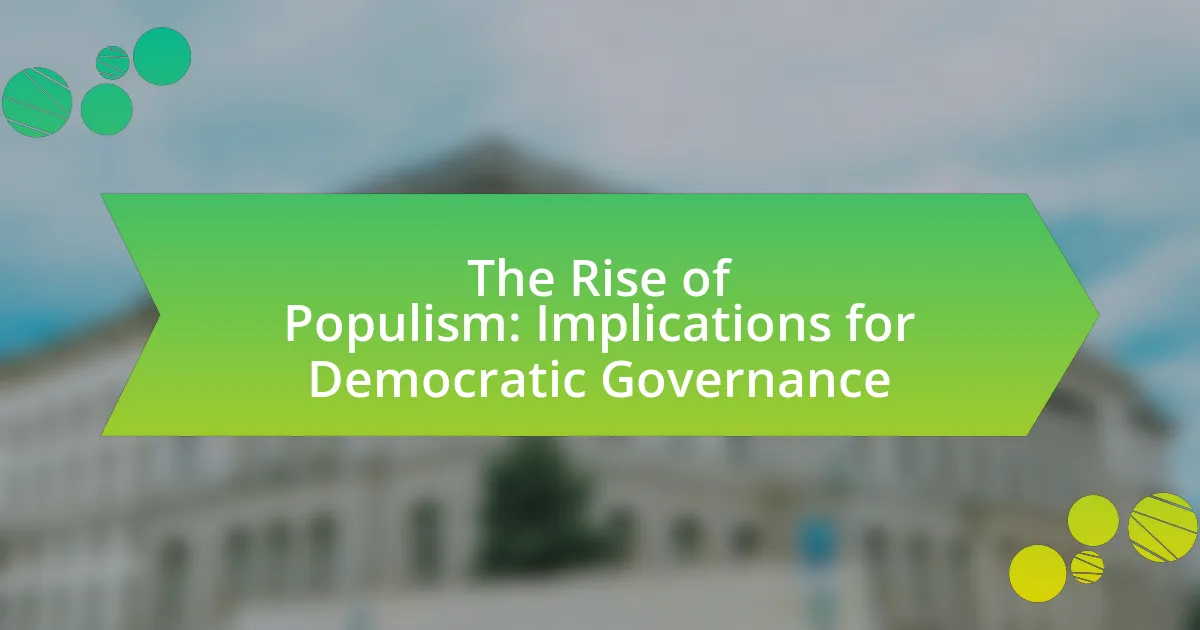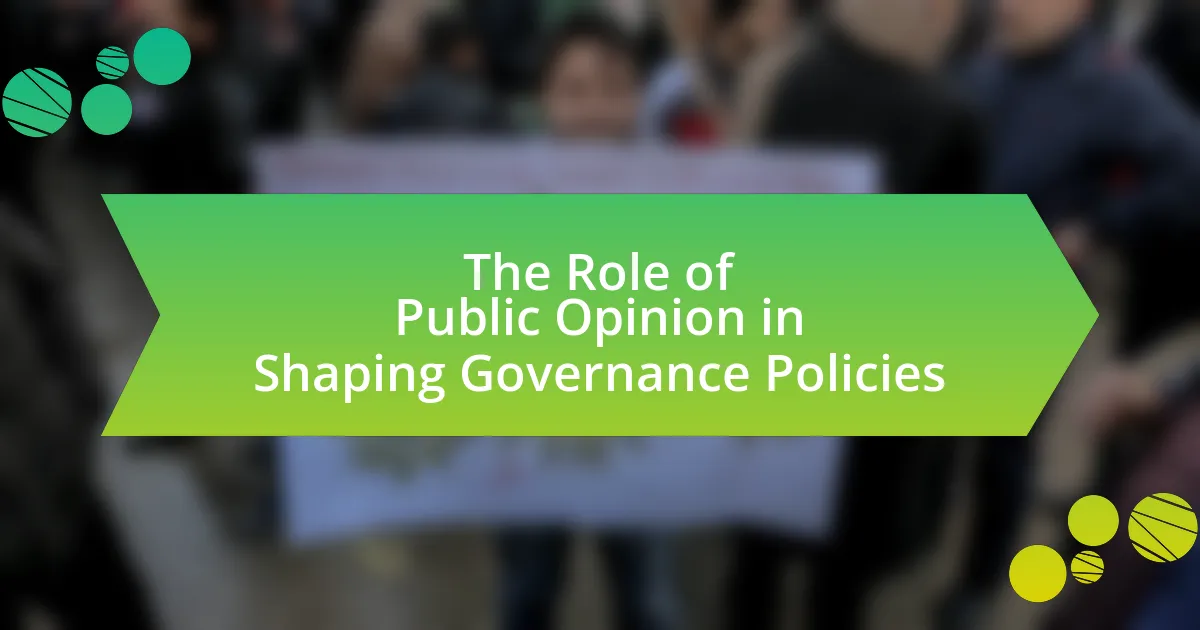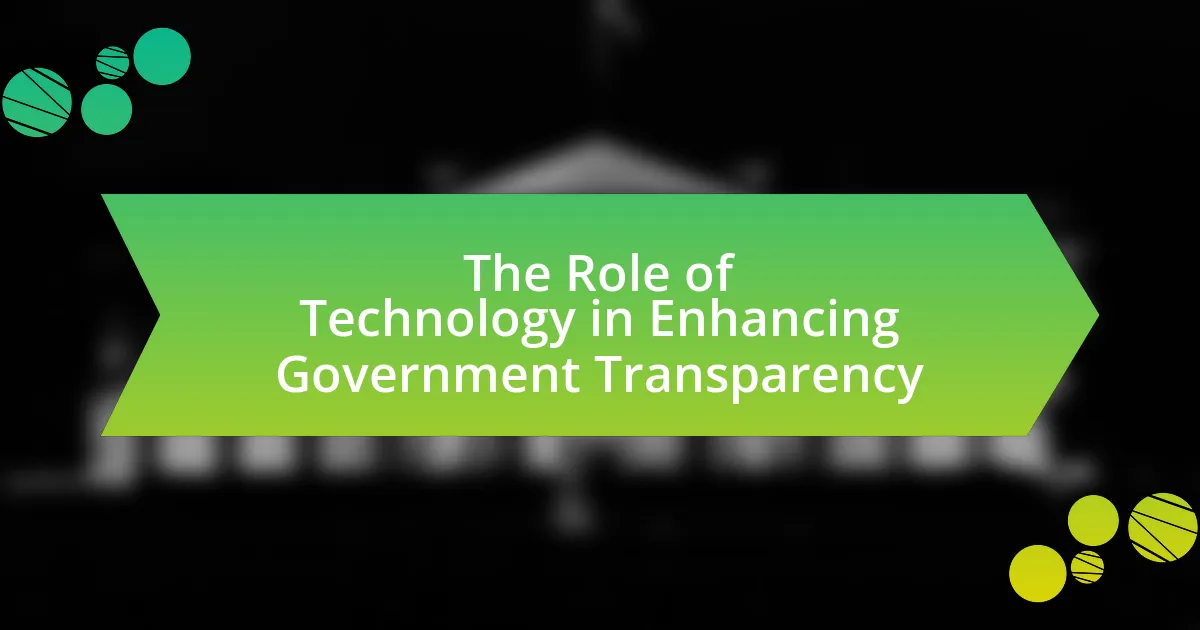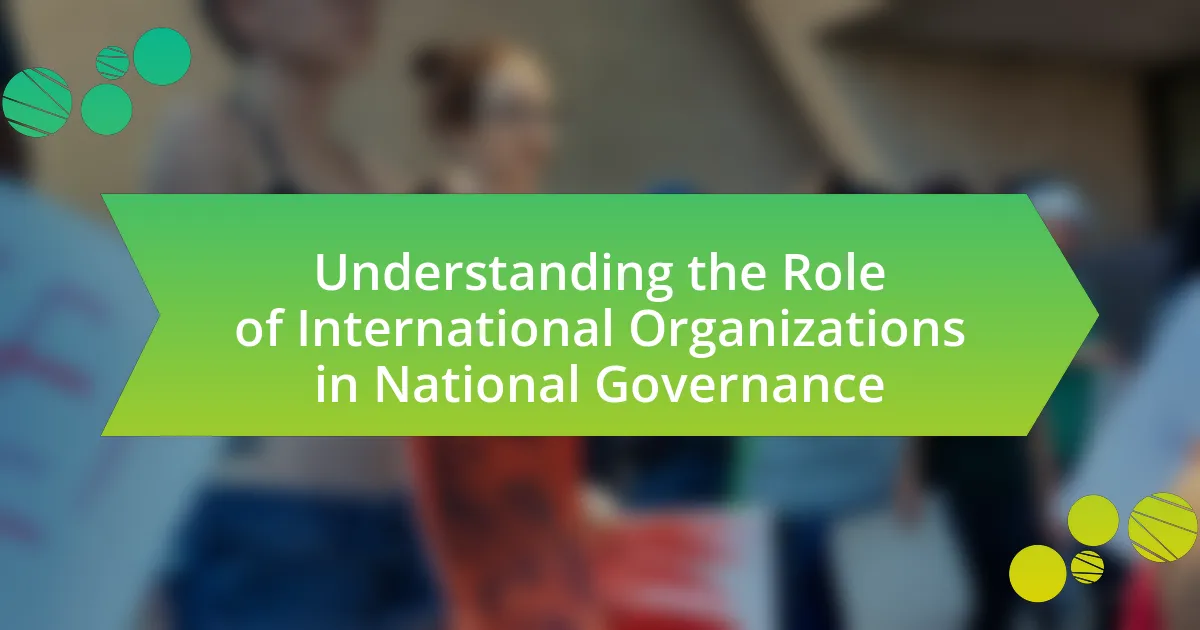The article examines the influence of social media on political accountability, highlighting how platforms like Twitter and Facebook enhance citizen engagement and transparency. It discusses the mechanisms through which social media facilitates real-time communication, enabling citizens to hold politicians accountable for their actions. Key topics include the role of transparency in fostering trust, the impact of misinformation and echo chambers on public perception, and the importance of civic engagement in a democratic society. Additionally, the article explores future trends in social media that may further shape political accountability, emphasizing the need for responsible use and education in navigating the digital landscape.
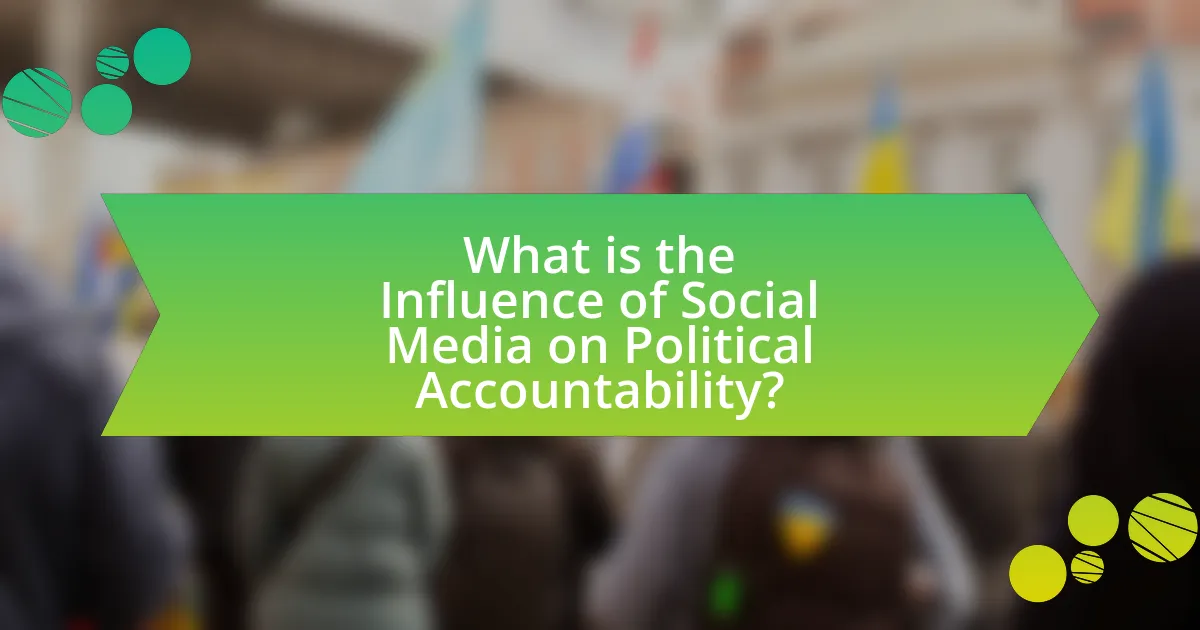
What is the Influence of Social Media on Political Accountability?
Social media significantly enhances political accountability by providing a platform for citizens to engage with and scrutinize their leaders. This engagement allows for real-time feedback and public discourse, which can pressure politicians to act transparently and responsibly. For instance, studies have shown that social media campaigns can mobilize public opinion, leading to increased voter awareness and participation, as evidenced by the Arab Spring, where social media played a crucial role in organizing protests against authoritarian regimes. Furthermore, platforms like Twitter and Facebook enable the rapid dissemination of information, making it easier for citizens to hold politicians accountable for their actions and promises.
How does social media shape political accountability?
Social media shapes political accountability by providing a platform for real-time communication and public engagement, enabling citizens to hold politicians accountable for their actions. This immediacy allows for rapid dissemination of information, where citizens can share grievances, mobilize support, and demand transparency from elected officials. For instance, studies have shown that social media campaigns can lead to significant political consequences, such as the resignation of public officials following public outcry on platforms like Twitter and Facebook. Additionally, social media analytics reveal that increased public scrutiny often correlates with higher levels of political responsiveness, as politicians adapt their strategies to align with public sentiment expressed online.
What are the key mechanisms through which social media influences political accountability?
Social media influences political accountability primarily through increased transparency, enhanced citizen engagement, and rapid dissemination of information. Increased transparency occurs as social media platforms allow citizens to access and share information about government actions and policies, making it harder for politicians to act without scrutiny. Enhanced citizen engagement is facilitated by social media enabling direct communication between citizens and their representatives, fostering a sense of participation and responsibility among the electorate. Rapid dissemination of information allows for swift public reaction to political events, which can pressure politicians to be more accountable for their actions. For instance, studies have shown that social media campaigns can mobilize public opinion quickly, leading to significant political consequences, such as the Arab Spring, where social media played a crucial role in organizing protests and demanding accountability from governments.
How do social media platforms facilitate political engagement and oversight?
Social media platforms facilitate political engagement and oversight by providing users with immediate access to information, enabling direct communication with political representatives, and fostering public discourse. These platforms allow citizens to share opinions, mobilize support for causes, and organize events, which enhances civic participation. For instance, during the Arab Spring, social media was instrumental in organizing protests and disseminating information, demonstrating its power in political mobilization. Additionally, social media enables real-time feedback to politicians, as seen in platforms like Twitter, where constituents can voice concerns and hold elected officials accountable for their actions. This dynamic interaction promotes transparency and encourages political leaders to respond to the electorate’s needs.
Why is political accountability important in a democratic society?
Political accountability is crucial in a democratic society because it ensures that elected officials are held responsible for their actions and decisions, fostering transparency and trust among citizens. When leaders know they can be scrutinized and must justify their choices, they are more likely to act in the public’s best interest. Historical examples, such as the Watergate scandal, illustrate how accountability mechanisms, like investigative journalism and public oversight, can lead to significant political reform and restore public confidence in government. Furthermore, studies show that societies with higher levels of political accountability experience lower levels of corruption and better governance outcomes, reinforcing the importance of this principle in maintaining a healthy democracy.
What role does transparency play in political accountability?
Transparency is essential for political accountability as it enables citizens to access information about government actions and decisions. When political processes are open and information is readily available, it fosters trust between the government and the public, allowing citizens to hold officials accountable for their actions. For instance, studies have shown that increased transparency in government operations correlates with reduced corruption levels, as seen in the Transparency International Corruption Perceptions Index, which highlights that countries with higher transparency scores tend to have more accountable political systems. Thus, transparency serves as a foundational element that empowers citizens to engage in informed oversight of their political representatives.
How does public trust relate to political accountability?
Public trust is essential for political accountability, as it fosters a relationship where citizens believe that their leaders will act in their best interests. When the public trusts political institutions and officials, they are more likely to engage in civic activities, such as voting and advocacy, which in turn holds leaders accountable for their actions. Research indicates that higher levels of public trust correlate with increased transparency and responsiveness from political leaders, as seen in studies conducted by the Pew Research Center, which found that trust in government significantly influences citizens’ perceptions of accountability. Thus, the interplay between public trust and political accountability is critical for a functioning democracy.
What challenges does social media pose to political accountability?
Social media poses significant challenges to political accountability by facilitating the spread of misinformation and creating echo chambers that distort public perception. Misinformation can undermine trust in political institutions and lead to misinformed voting decisions, as evidenced by studies showing that false information spreads faster on platforms like Twitter than factual content. Additionally, echo chambers reinforce existing beliefs, making it difficult for citizens to engage with diverse viewpoints, which is essential for informed political discourse. This environment can diminish the ability of citizens to hold politicians accountable, as they may be less exposed to critical perspectives and factual information necessary for effective civic engagement.
How do misinformation and disinformation affect political accountability?
Misinformation and disinformation significantly undermine political accountability by distorting public perception and eroding trust in institutions. When false information spreads through social media, it can lead to misinformed voting decisions and public opinion, ultimately affecting electoral outcomes and policy support. For instance, a study by the Pew Research Center found that 64% of Americans believe that fabricated news stories cause confusion about the basic facts of current events, which can lead to decreased accountability for political leaders. This erosion of trust makes it difficult for citizens to hold politicians responsible for their actions, as they may be influenced by misleading narratives rather than factual information.
What are the implications of echo chambers on political discourse?
Echo chambers significantly polarize political discourse by reinforcing existing beliefs and limiting exposure to diverse viewpoints. This phenomenon occurs as individuals engage primarily with like-minded peers, leading to a lack of critical debate and increased ideological extremism. Research by the Pew Research Center indicates that social media users often curate their feeds to align with their political preferences, which exacerbates this effect. Consequently, echo chambers contribute to misinformation spread, as users are less likely to encounter fact-checking or opposing perspectives, ultimately undermining democratic deliberation and accountability.
How can social media enhance political accountability?
Social media enhances political accountability by providing a platform for real-time communication and public engagement, allowing citizens to hold politicians accountable for their actions. Through social media, individuals can share information, mobilize support for causes, and directly question elected officials, thereby increasing transparency. For instance, studies have shown that platforms like Twitter and Facebook enable rapid dissemination of information regarding political decisions, leading to increased public scrutiny. A report by the Pew Research Center indicates that 69% of adults in the U.S. use social media, which amplifies the voices of constituents and fosters a culture of accountability.
What strategies can be employed to leverage social media for greater accountability?
To leverage social media for greater accountability, organizations can implement transparency initiatives, engage in active communication, and utilize data analytics. Transparency initiatives, such as sharing decision-making processes and outcomes publicly, foster trust and allow stakeholders to hold entities accountable. Active communication involves responding to public inquiries and feedback in real-time, which enhances engagement and demonstrates responsiveness. Utilizing data analytics enables organizations to track public sentiment and engagement metrics, allowing for informed adjustments to strategies and policies. Research indicates that transparency and responsiveness on social media can significantly improve public trust and accountability, as evidenced by studies showing that organizations with higher social media engagement report better public perceptions and accountability ratings.
How can citizens use social media to hold politicians accountable?
Citizens can use social media to hold politicians accountable by actively engaging in discussions, sharing information, and mobilizing collective action. Social media platforms allow individuals to voice concerns, share evidence of political misconduct, and organize campaigns that demand transparency and accountability from elected officials. For instance, the Arab Spring demonstrated how social media facilitated grassroots movements that pressured governments to respond to citizens’ demands. Additionally, studies show that public scrutiny on platforms like Twitter can lead to increased responsiveness from politicians, as they are aware that their actions are being monitored by the electorate.
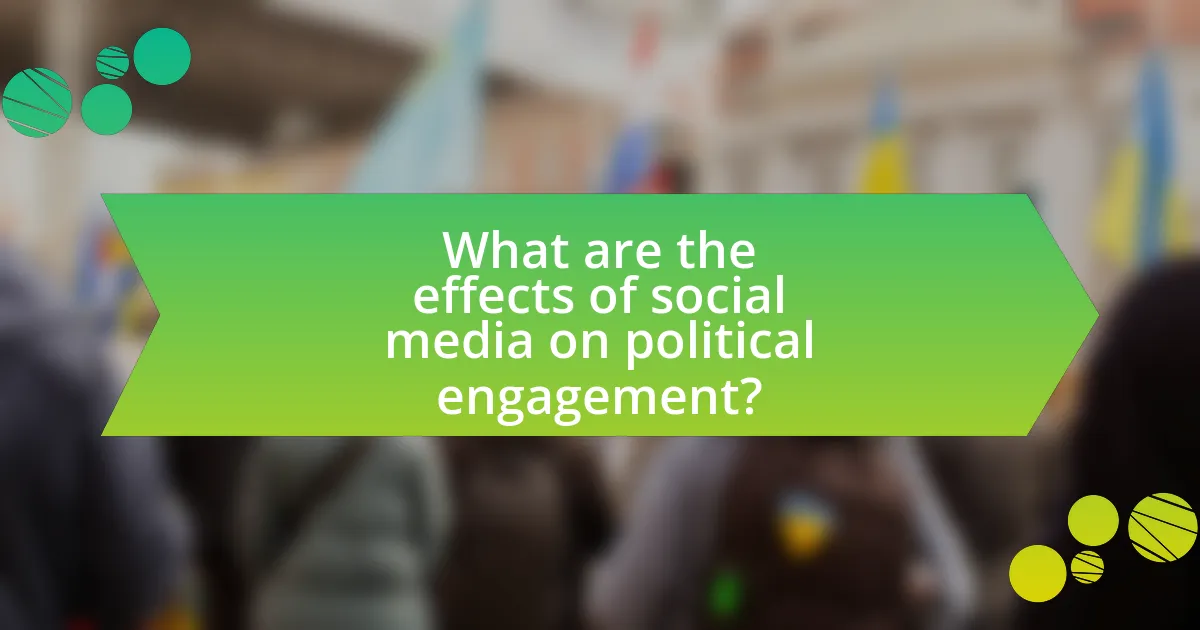
What are the effects of social media on political engagement?
Social media significantly enhances political engagement by facilitating communication, mobilizing activism, and increasing access to information. Platforms like Twitter and Facebook allow users to share political content rapidly, which can lead to higher levels of public discourse and participation in political processes. For instance, a study by the Pew Research Center found that 69% of adults in the U.S. use social media, and among those, 57% have engaged in political discussions online, demonstrating a direct correlation between social media usage and political involvement. Additionally, social media campaigns have been pivotal in mobilizing grassroots movements, such as the Arab Spring, where platforms were instrumental in organizing protests and disseminating information. This evidence underscores the transformative role of social media in shaping political engagement.
How does social media mobilize political participation?
Social media mobilizes political participation by providing platforms for information dissemination, community engagement, and grassroots organizing. These platforms enable users to share political content, mobilize support for causes, and coordinate actions such as protests or voting drives. For instance, during the Arab Spring, social media was instrumental in organizing protests and spreading awareness, leading to significant political changes in several countries. Research by the Pew Research Center indicates that 69% of adults in the U.S. use social media, which enhances their ability to engage in political discussions and activities. This widespread usage demonstrates how social media serves as a critical tool for increasing political participation and accountability.
What demographics are most influenced by social media in political contexts?
Young adults, particularly those aged 18 to 29, are the demographics most influenced by social media in political contexts. Research indicates that this age group is more likely to engage with political content on platforms like Twitter, Instagram, and TikTok, significantly shaping their political opinions and behaviors. A study by the Pew Research Center found that 69% of adults aged 18 to 29 use social media for political news, compared to 49% of those aged 30 to 49 and only 29% of those aged 50 and older. This trend highlights the critical role social media plays in informing and mobilizing younger voters, making them a key demographic in political discourse.
How do social media campaigns impact voter turnout?
Social media campaigns significantly increase voter turnout by enhancing engagement and mobilizing potential voters. Research indicates that targeted social media efforts can lead to a 3-5% increase in voter participation, particularly among younger demographics. For instance, a study by the Pew Research Center found that 69% of adults aged 18-29 reported being influenced by social media in their voting decisions during the 2020 election. This influence stems from the ability of social media platforms to disseminate information rapidly, create community discussions, and facilitate grassroots organizing, thereby motivating individuals to participate in elections.
What role do influencers play in shaping political accountability on social media?
Influencers play a significant role in shaping political accountability on social media by amplifying messages, mobilizing audiences, and holding political figures accountable for their actions. They leverage their large followings to disseminate information quickly, often highlighting issues that may be overlooked by traditional media. For instance, during the 2020 U.S. presidential election, influencers on platforms like Instagram and TikTok encouraged voter registration and informed their audiences about candidates’ positions, thereby increasing political engagement among younger demographics. Research indicates that social media influencers can sway public opinion and encourage civic participation, making them powerful agents in the political landscape.
How do influencers affect public perception of political issues?
Influencers significantly shape public perception of political issues by leveraging their platforms to disseminate information and opinions. Their large followings allow them to reach diverse audiences, often framing political narratives in ways that resonate with their followers. For instance, a study by the Pew Research Center found that 70% of social media users have encountered political content on these platforms, indicating that influencers play a crucial role in shaping political discourse. Additionally, influencers can mobilize their audiences to engage in political activism, as seen during movements like Black Lives Matter, where social media influencers amplified messages and encouraged participation. This demonstrates that influencers not only affect perceptions but also drive public engagement with political issues.
What are the ethical considerations surrounding influencer involvement in politics?
Influencer involvement in politics raises significant ethical considerations, primarily concerning transparency, authenticity, and the potential for manipulation. Influencers often have substantial reach and can sway public opinion, which necessitates clear disclosure of any political affiliations or sponsorships to maintain trust with their audience. For instance, the Federal Trade Commission (FTC) mandates that influencers disclose paid partnerships, highlighting the importance of transparency in their political endorsements. Additionally, the authenticity of an influencer’s message can be compromised if they prioritize financial gain over genuine beliefs, leading to misinformation and a lack of accountability. The potential for influencers to exploit their platforms for political gain without proper oversight poses risks to democratic processes, as seen in various instances where social media campaigns have been used to spread disinformation.
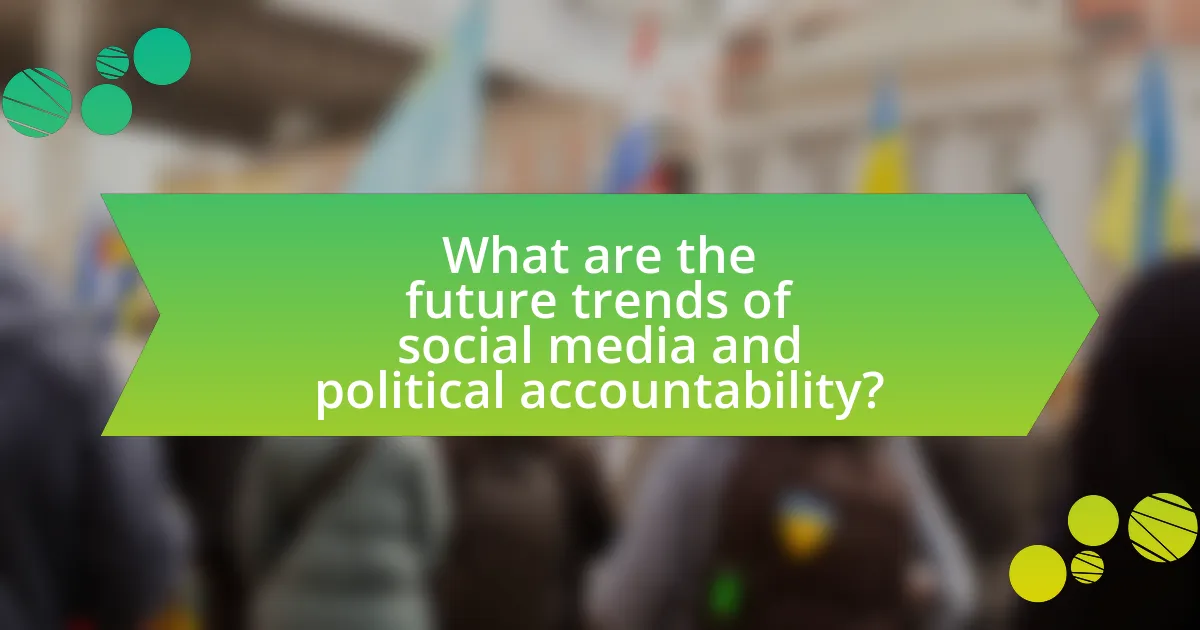
What are the future trends of social media and political accountability?
Future trends of social media and political accountability include increased transparency, enhanced citizen engagement, and the rise of fact-checking initiatives. As social media platforms evolve, they are likely to implement more robust mechanisms for accountability, such as real-time monitoring of political statements and actions. For instance, studies indicate that platforms like Twitter and Facebook are already experimenting with features that flag misinformation, which can lead to greater scrutiny of political figures. Additionally, the use of data analytics will empower citizens to hold politicians accountable by tracking promises and performance metrics, as evidenced by the growing popularity of platforms that aggregate and analyze political data. These trends suggest a shift towards a more informed electorate that leverages social media to demand accountability from their leaders.
How is technology evolving to impact political accountability through social media?
Technology is evolving to enhance political accountability through social media by enabling real-time communication and transparency between citizens and their representatives. Social media platforms facilitate the rapid dissemination of information, allowing users to share political developments, government actions, and public opinions instantly. For instance, during the Arab Spring, social media was pivotal in mobilizing protests and holding governments accountable, demonstrating its power in political movements. Additionally, tools like fact-checking websites and data analytics are increasingly integrated into social media, empowering users to verify claims made by politicians and hold them accountable for misinformation. This evolution is supported by studies showing that increased social media engagement correlates with higher levels of political participation and accountability, as seen in research published by the Pew Research Center, which highlights the role of social media in fostering civic engagement.
What emerging platforms are likely to influence political accountability?
Emerging platforms such as TikTok, Clubhouse, and decentralized social networks like Mastodon are likely to influence political accountability. TikTok’s short-form video content allows for rapid dissemination of political messages and grassroots mobilization, evidenced by its role in youth voter engagement during recent elections. Clubhouse facilitates real-time discussions and debates, enabling direct interaction between politicians and constituents, which can enhance transparency. Decentralized networks like Mastodon promote user control over content and privacy, potentially reducing misinformation and fostering accountability among political figures. These platforms collectively reshape how information is shared and consumed, impacting political discourse and accountability.
How might regulations on social media affect political discourse?
Regulations on social media can significantly shape political discourse by controlling the flow of information and moderating content. For instance, stricter regulations may reduce the spread of misinformation, thereby fostering a more informed electorate. Research indicates that platforms implementing fact-checking measures have seen a decrease in the dissemination of false information, which can enhance the quality of political discussions. Conversely, excessive regulation may stifle free speech, leading to a homogenization of viewpoints and limiting diverse political expressions. Studies show that when users perceive censorship, they may withdraw from engaging in political discussions altogether, which can diminish democratic participation. Thus, the impact of regulations on social media is multifaceted, influencing both the quality and diversity of political discourse.
What best practices can enhance the positive influence of social media on political accountability?
Best practices that can enhance the positive influence of social media on political accountability include promoting transparency, encouraging civic engagement, and utilizing fact-checking mechanisms. Transparency can be achieved by public officials sharing information about their decisions and actions through social media platforms, which fosters trust and allows citizens to hold them accountable. Encouraging civic engagement involves creating interactive platforms where citizens can voice their concerns and participate in discussions, thereby increasing public scrutiny of political actions. Utilizing fact-checking mechanisms helps combat misinformation, ensuring that citizens receive accurate information about political issues and decisions, which is crucial for informed accountability. Studies have shown that increased transparency and civic engagement through social media correlate with higher levels of political accountability, as evidenced by the Arab Spring, where social media played a pivotal role in mobilizing citizens against corrupt regimes.
How can individuals and organizations effectively use social media for advocacy?
Individuals and organizations can effectively use social media for advocacy by creating targeted campaigns that engage their audience and promote specific causes. These campaigns should utilize compelling visuals, clear messaging, and relevant hashtags to increase visibility and encourage sharing. For instance, the #MeToo movement gained significant traction on social media, demonstrating how a focused hashtag can mobilize support and raise awareness about sexual harassment. Additionally, organizations can leverage analytics tools to track engagement and adjust strategies based on audience feedback, ensuring that their advocacy efforts resonate with the public. This approach not only amplifies their message but also fosters a sense of community among supporters, ultimately driving political accountability and social change.
What role does education play in promoting responsible social media use in politics?
Education plays a crucial role in promoting responsible social media use in politics by equipping individuals with critical thinking skills and media literacy. These skills enable users to discern credible information from misinformation, which is essential in a political landscape often rife with false narratives. Research indicates that educational programs focused on digital literacy can significantly reduce the spread of misinformation; for instance, a study by the Stanford History Education Group found that students who received media literacy training were better at identifying misleading information online. Thus, education fosters informed engagement in political discourse, ultimately enhancing political accountability through responsible social media practices.
